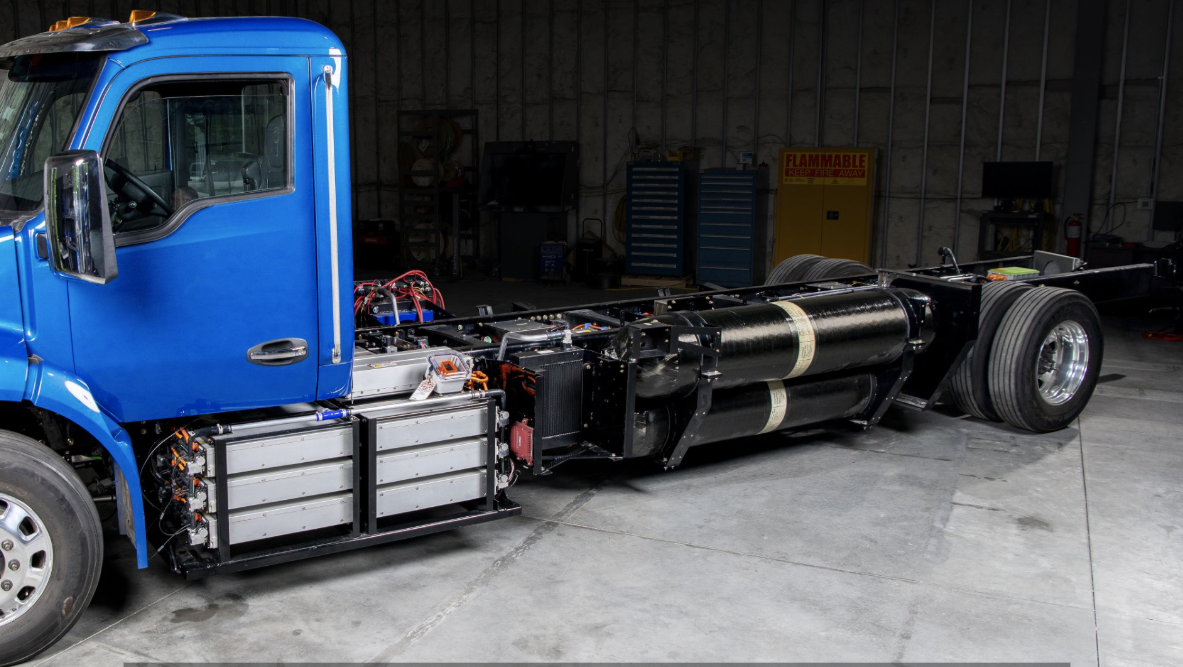4/28/25
 Fontaine Modification (Charlotte, North Carolina) is leading a consortium of companies working together to develop a Class 6 fuel-cell-electric truck to meet the demands of “middle mile” delivery logistics. The consortium includes Ballard Power Systems, Forsee Power and Linamar Corporation.
Fontaine Modification (Charlotte, North Carolina) is leading a consortium of companies working together to develop a Class 6 fuel-cell-electric truck to meet the demands of “middle mile” delivery logistics. The consortium includes Ballard Power Systems, Forsee Power and Linamar Corporation.
Fontaine Modification is serving as the vehicle and systems integrator. It is assembling the fuel cell electric vehicle (FCEV) on a 26,000-pound GVWR straight truck chassis at its flagship Charlotte, N.C., modification center. Ballard Power Systems is supplying the fuel cell system, and Forsee Power is supplying the high-voltage battery system. Linamar Corporation is providing the FCEV’s eAxle.
“Fontaine Modification is excited to lead this team of well-established companies that are committed to bringing clean mobility solutions to the commercial vehicle market,” said David Brosky, Fontaine Modification director, sales & business development – eMobility. “We are on track to complete a pilot unit this summer. The pilot unit will then undergo independent track testing before being handed over to its first customer, a large commercial fleet in the U.S., for a six-month trial during which it will be operated over regular routes.”
The pilot vehicle will be fitted with a lift-gated dry freight body built by Fontaine sister company Kentucky Trailer. The consortium anticipates that upon successful completion of the field trial, regular production of the truck will begin as early as late 2026.
“The middle-mile segment covers freight hauled between warehouses or distribution centers,” Brosky explained. “This segment is usually the longest, with runs within states or across regions of typically 300 to 500 miles. It’s that need for longer range that makes a fuel-cell system the best zero-emission option for efficiently powering a middle-mile truck.”
The project provides consortium members a unique opportunity to demonstrate their latest technology and capabilities to help fleets achieve their goals.
“Ballard is showcasing the value of its latest fuel cell system FCmove®-XD in North America for the first time,” said Nicolas Pocard, Ballard Power Systems vice president marketing & strategic partnerships. “The module provides an easy integration platform for vehicle OEMs and integrators and is designed to deliver up to 60 percent fuel efficiency with volumetric power density of 0.36kW/L while lasting over 30,000 hours in operation. Developed for volume production, this commercial and scalable fuel cell module provides a competitive total cost of ownership.”
Balancing and optimizing fuel cell and battery power is essential to achieve maximum efficiency, performance, and operational longevity.
Jeremy Hiler, Forsee Power sales manager, truck and off highway, noted, “Battery systems are critical to fuel-cell-electric vehicles. Depending on the situation, the FCEV is driven by the battery, by the fuel cell, or by both if extra power is needed. It was critical to offer a solution that can meet the technical needs of long distance (power peaks on highway) and local deliveries, optimizing the cost.”
The new FCEV offers a multitude of benefits to fleets and drivers.
“The vehicle's low-maintenance design helps fleet operators reduce operational costs, while its quiet propulsion system provides a smoother and less intrusive experience for drivers and others on the road,” said Kevin Ledford, vice president of engineered product at Linamar. “Regenerative braking recoups energy that might otherwise be lost, boosting the vehicle's overall efficiency. Separately, it reduces wear and tear on critical components, leading to lower maintenance costs and improved durability.”
For more information, visit fontainemodification.com.